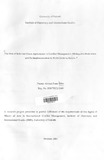| dc.description.abstract | This study investigates the contribution of informal peace agreements to conflict management, the theme of the research, using the case study of Modogashe declaration and its implementation in North Eastern Kenya. The study was enriched further by discussions on formal and informal conflict management mechanisms which have given the strengths and weaknesses of these two systems. Suggested solutions on how to improve on the strengths while addressing the challenges have been given towards the end of the study.
The study employed a simple and appropriate methodology to collect primary data from the field. Thirty respondents from the entire population in North Eastern were sampled to collect primary data using interviews and questionnaires. These informants comprised of clan elders, members of district peace committees, local politicians, government officers dealing with security matters, youth and women representatives, and Non-governmental organisations. In addition, secondary data was sourced from published books, magazines, newspapers as well as reports by research institutions, universities and government agencies which are relevant to the topic. The data collected was analysed and interpreted using content analysis.
The study found that informal peace agreements play important roles in managing conflicts among the communities in Northern Province. Their strengths lie in the application of indigenous conflict management mechanisms that employ holistic, consensus-based reconciliatory approaches which promote problem-solving dialogue and redefinition of relationships among conflicting parties. However, the applications of informal accords raise some challenges, the main one being incompatibility of this accords with official laws of the country. Suggestions to address these challenges have been highlighted in the document. It is the hope of the writer that this research has met the expectations of the intended stakeholders in terms of both theoretical and policy relevance, and wish interested readers a pleasant flow and understanding | en_US |



